- Home
- Michael Grant
Hunger_A Gone Novel Page 2
Hunger_A Gone Novel Read online
Page 2
G R A N T
in preparation, worked them down beneath the leaves, down
to cradle the cabbage. Then he fell back on his rear end. “Ow!”
he yelled.
“Not so easy, is it?” Edilio teased.
“Ah! Ah!” E.Z. jumped to his feet. He was holding his right
hand with his left and staring hard at his hand. “No, no, no.”
Sam had been only half listening. His mind was elsewhere,
scanning for the missing birds, but the terror in E.Z.’s voice
snapped his head around. “What’s the matter?”
“Something bit me!” E.Z. cried. “Oh, oh, it hurts. It hurts.
It—” E.Z. let loose a scream of agony. The scream started low
and went higher, higher into hysteria.
Sam saw what looked like a black question mark on E.Z.’s
pant leg.
“Snake!” Sam said to Edilio.
E.Z.’s arm went into a spasm. It shook violently. It was as if
some invisible giant had hold of it and were yanking his arm
as hard and as fast as it could.
E.Z. screamed and screamed and began a lunatic dance.
“They’re in my feet!” he cried. “They’re in my feet!”
Sam stood paralyzed for a few seconds, just a few seconds—
but later in memory it would seem so long. Too long.
He leaped forward, rushing toward E.Z. He was brought
down hard by a flying tackle from Edilio.
“What are you doing?” Sam demanded, and struggled to
free himself.
“Man, look. Look!” Edilio whispered.
Sam’s face was mere feet from the first row of cabbages.
H U N G E R 9
The soil was alive. Worms. Worms as big as garter snakes
were seething up from beneath the dirt. Dozens. Maybe hundreds. All heading toward E.Z., who screamed again and again in agony mixed with confusion.
Sam rose to his feet but went no closer to the edge of the
cabbage field. The worms did not move beyond the first
row of turned soil. There might as well have been a wall, the
worms all on one side.
E.Z. came staggering wildly toward Sam, walking as if
he were being electrocuted, jerking, flailing like some crazy
puppet with half its strings cut.
Three, four feet away, a long arm-stretch away, Sam saw
the worm erupt from the skin of E.Z.’s throat.
And then another from his jaw, just in front of his ear.
E.Z., no longer screaming, sagged to the ground, just sat
there limp, cross-legged.
“Help me,” E.Z. whispered. “Sam . . .”
E.Z.’s eyes were on Sam. Pleading. Fading. Then just staring, blank.
The only sounds now came from the worms. Their hundreds of mouths seemed to make a single sound, one big mouth chewing wetly.
A worm spilled from E.Z.’s mouth.
Sam raised his hands, palms out.
“Sam, no!” Albert yelled. Then, in a quieter voice, “He’s
already dead. He’s already dead.”
“Albert’s right, man. Don’t do it, don’t burn them, they’re
staying in the field, don’t give them a reason to come after us,”
10 M I C H A E L
G R A N T
Edilio hissed. His strong hands still dug into Sam’s shoulders,
like he was holding Sam back, though Sam wasn’t trying to
escape any longer.
“And don’t touch him,” Edilio sobbed. “Perdóneme, God
forgive me, don’t touch him.”
The black worms swarmed over and through E.Z.’s body.
Like ants swarming a dead beetle.
It felt like a very long time before the worms slithered away
and tunneled back into the earth.
What they left behind was no longer recognizable as a
human being.
“There’s a rope here,” Albert said, stepping down at last
from the Jeep. He tried to tie a lasso, but his hands were shaking too badly. He handed the rope to Edilio, who formed a loop and after six misses finally snagged what was left of
E.Z.’s right foot. Together they dragged the remains from the
field.
A single tardy worm crawled from the mess and headed
back toward the cabbages. Sam snatched up a rock the size
of a softball and smashed it down on the worm’s back. The
worm stopped moving.
“I’ll come back with a shovel,” Edilio said. “We can’t take
E.Z. home, man, he’s got two little brothers. They don’t need
to be seeing this. We’ll bury him here.
“If these things spread . . . ,” Edilio began.
“If they spread to the other fields, we all starve,” Albert
said.
Sam fought a powerful urge to throw up. E.Z. was mostly
H U N G E R
11
bones now, picked not quite clean. Sam had seen terrible
things since the FAYZ began, but nothing this gruesome.
He wiped his hands on his jeans, wanting to hit back,
wishing it made sense to blast the field, burn as much of it
as he could reach, keep burning it until the worms shriveled
and crisped.
But that was food out there.
Sam knelt beside the mess in the dirt. “You were a good
kid, E.Z. Sorry. I . . . sorry.” There was music, tinny, but recognizable, still coming from E.Z.’s iPod.
Sam lifted the shiny thing and tapped the pause icon.
Then he stood up and kicked the dead worm out of the
way. He held his hands out as though he were a minister
about to bless the body.
Albert and Edilio knew better. They both backed away.
Brilliant light shot from Sam’s palms.
The body burned, crisped, turned black. Bones made loud
snapping noises as they cracked from the heat. After a while
Sam stopped. What was left behind was ash, a heap of gray
and black ashes that could have been the residue of a backyard barbecue.
“There was nothing you could have done, Sam,” Edilio
said, knowing that look on his friend’s face, knowing that
gray, haggard look of guilt. “It’s the FAYZ, man. It’s just the
FAYZ.”
TWO
106 HOURS, 16 MINUTES
T H E R O O F W A S on crooked. The blistering bright sun
stabbed a ray straight down into Caine’s eye through the gap
between crumbled wall and sagging roof.
Caine lay on his back, sweating into a pillow that had no
case. A dank sheet wrapped around his bare legs, twisted to
cover half his naked torso. He was awake again, or at least he
thought he was, believed he was.
Hoped he was.
It wasn’t his bed. It belonged to an old man named Mose,
the groundskeeper for Coates Academy.
Of course Mose was gone. Gone with all the other adults.
And all the older kids. Everyone . . . almost everyone . . . over
the age of fourteen. Gone.
Gone where?
No one knew.
Just gone. Beyond the barrier. Out of the giant fishbowl
called the FAYZ. Maybe dead. Maybe not. But definitely
gone.
H U N G E R
13
Diana opened the door with a kick. She was carrying a
tray and balanced on the tray was a bottle of water and a can
of Goya brand garbanzo beans.
“Are you decent?” Diana asked.
He didn’t answer. He didn’t understand the question.
her tone. She set the tray on the side table.
Caine didn’t bother to answer. He sat up. His head swam
as he did. He reached for the water.
“Why is the roof messed up like that? What if it rains?” He
was surprised by the sound of his own voice. He was hoarse.
His voice had none of its usual persuasive smoothness.
Diana was pitiless. “What are you, stupid now as well as
crazy?”
A phantom memory passed through him, leaving him
feeling uneasy. “Did I do something?”
“You lifted the roof up.”
He turned his hands around to look at his palms. “Did I?”
“Another nightmare,” Diana said.
Caine twisted open the bottle and drank. “I remember
now. I thought it was crushing me. I thought something was
going to step on the house and crush it, squash me under it.
So I pushed back.”
“Uh-huh. Eat some beans.”
“I don’t like beans.”
“No one likes beans,” Diana said. “But this isn’t your
neighborhood Applebee’s. And I’m not your waitress. Beans
are what we have. So eat some beans. You need food.”
Caine frowned. “How long have I been like this?”
14 M I C H A E L
G R A N T
“Like what?” Diana mocked him. “Like a mental patient
who can’t tell if he’s in reality or in a dream?”
He nodded. The smell of the beans was sickening. But he
was suddenly hungry. And he remembered now: food was in
short supply. Memory was coming back. The mad delusion was
fading. He couldn’t quite reach normal, but he could see it.
“Three months, give or take a week,” Diana said. “We had
the big shoot-out in Perdido Beach. You wandered off into
the desert with Pack Leader and were gone for three days.
When you came back you were pale, dehydrated, and . . . well,
like you are.”
“Pack Leader.” The words, the creature they represented,
made Caine wince. Pack Leader, the dominant coyote, the
one who had somehow attained a limited sort of speech. Pack
Leader, the faithful, fearful servant of . . . of it. Of it. Of the
thing in the mine shaft.
The Darkness, they called it.
Caine swayed and before he rolled off the bed, Diana
caught him, grabbed his shoulders, kept him up. But then
she saw the warning sign in his eyes and muttered a curse
and managed to get the wastebasket in front of him just as
he vomited.
He didn’t produce much. Just a little yellow liquid.
“Lovely,” she said, and curled her lip. “On second thought,
don’t eat any beans. I don’t want to see them come back up.”
Caine rinsed his mouth with some of the water. “Why are
we here? This is Mose’s cottage.”
“Because you’re too dangerous. No one at Coates wants
H U N G E R
15
you around until you get a grip on yourself.”
He blinked at another returning memory. “I hurt someone.”
“You thought Chunk was some kind of monster. You
were yelling a word. Gaiaphage. Then you smacked Chunk
through a wall.”
“Is he okay?”
“Caine. In the movies a guy can get knocked through a
wall and get up like it’s no big deal. This wasn’t a movie. The
wall was brick. Chunk looked like roadkill. Like when a raccoon gets run over and over and over and keeps getting run over for a couple of days.”
The harshness of her words was too much even for Diana
herself. She gritted her teeth and said, “Sorry. It wasn’t pretty.
I never liked Chunk, but it wasn’t something I can just forget,
okay?”
“I’ve been kind of out of my mind,” Caine said.
Diana wiped angrily at a tear. “Answer the question: Can
you give an example of understatement?”
“I think I’m better now,” Caine said. “Not all the way better. Not all the way. But better.”
“Well, happy day,” Diana said.
For the first time in weeks Caine focused on her face. She
was beautiful, Diana Ladris was, with enormous dark eyes
and long brown hair and a mouth that defaulted to smirk.
“You could have ended up like Chunk,” Caine said. “But
you’ve been taking care of me, anyway.”
She shrugged. “It’s a hard new world. I have a choice: stick
by you, or take my chances with Drake.”
16 M I C H A E L
G R A N T
“Drake.” The name conjured dark images. Dream or reality? “What’s Drake doing?”
“Playing junior Caine. Supposedly representing you.
Secretly hoping you’ll just die, if you ask me. He raided the
grocery store and stole some food a few days ago. It’s made
him almost popular. Kids don’t have a lot of judgment when
they’re hungry.”
“And my brother?”
“Sam?”
“I don’t have another long-lost brother, do I?”
“Bug’s gone into town a couple of times to see what’s going
on. He says people still have a little food but they’re getting
worried about it. Especially since Drake’s raid. But Sam is
totally in charge there.”
“Hand me my pants,” Caine said.
Diana did as he asked, then ostentatiously turned away as
he pulled them on.
“What defenses do they have up?” Caine asked.
“They keep people all over the grocery store now, that’s
the main thing. Now Ralph’s always has four guys with guns
sitting on the roof.”
Caine nodded. He bit at his thumbnail, an old habit. “How
about freaks?”
“They have Dekka and Brianna and Taylor. They have
Jack. They may have some other useful freaks, Bug isn’t sure.
They have Lana to heal people. And Bug thinks they have a
kid who can fire some kind of heat wave.”
“Like Sam?”
H U N G E R
17
“No. Sam’s like a blowtorch. This kid is like a microwave.
You don’t see any flames or anything. It’s just that suddenly
your head is cooking like a breakfast burrito in a Kitchen-
Aid.”
“People are still developing powers,” Caine said. “Any
here?”
Diana shrugged. “Who knows for sure? Who’s going to be
crazy enough to tell Drake? Down in town a new mutant gets
some respect. Up here? Maybe they get killed.”
“Yeah,” Caine said. “That was a mistake. Coming down on
the freaks, that was a mistake. We need them.”
“Plus, in addition to some possible new moofs, Sam’s people still have machine guns. And they still have Sam,” Diana said. “So how about if we don’t do something stupid like try
and fight them again?”
“Moofs?”
“Short for mutant. Mutant freaks. Moofs.” Diana shrugged.
“Moofs, muties, freaks. We’re out of food, but we’ve got plenty
of nicknames.”
Caine’s shirt was laid over the back of a chair. He reached
for it, wobbled, and seemed about to fall over. Diana steadied
him. He glared at her hand on his arm
. “I can walk.”
He glanced up and caught sight of his reflection in a mirror over the dresser. He almost didn’t recognize himself.
Diana was right: He was pale, his cheeks were concave. His
eyes seemed too large for his face.
“I guess you are getting better: you’re becoming a prickly
jerk again.”
18 M I C H A E L
G R A N T
“Get Bug in here. Get Bug and Drake. I want to see them
both.”
Diana made no move. “Are you going to tell me what happened to you out there in the desert with Pack Leader?”
Caine snorted. “You don’t want to know.”
“Yes,” Diana insisted, “I do.”
“All that matters is I’m back,” Caine said with all the bravado he could manage.
Diana nodded. The movement caused her hair to fall forward, to caress her perfect cheek. Her eyes glittered moistly.
But her lush lips still curled into an expression of distaste.
“What’s it mean, Caine? What does ‘gaiaphage’ mean?”
He shrugged. “I don’t know. I’ve never heard the word
before.”
Why was he lying to her? Why did it seem so dangerous
that she should know that word?
“Go get them,” Caine said, dismissing her. “Get Drake and
Bug.”
“Why don’t you take it easy? Make sure you’re really . . . I
was going to say ‘sane,’ but that might be setting the bar kind
of high.”
“I’m back,” Caine reiterated. “And I have a plan.”
She stared at him, head tilted sideways, skeptical. “A
plan.”
“I have things I have to do,” Caine said, and looked down,
incapable, for reasons he couldn’t quite grasp, of meeting her
gaze.
“Caine, don’t do this,” Diana said. “Sam let you walk away
H U N G E R
19
alive. He won’t do that a second time.”
“You want me to bargain with him? Work something
out?”
“Yes.”
“Well then, that’s just what I’m going to do, Diana. I’m
going to bargain. But first I need something to bargain with.
And I know just the thing.”
Astrid Ellison was in the overgrown backyard with Little
Pete when Sam brought her the news and the worm. Pete was
swinging. Or more accurately he was sitting on the swing as
Astrid pushed him. He seemed to like it.
It was dull, monotonous work pushing the swing with
almost never a word of conversation or a sound of joy from

 Fear
Fear Plague
Plague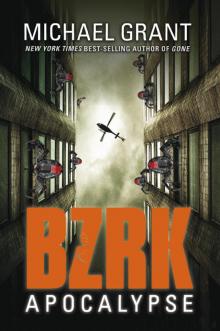 BZRK: Apocalypse
BZRK: Apocalypse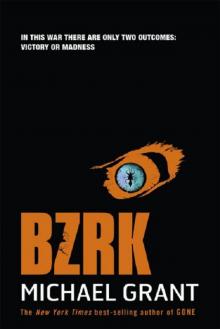 Bzrk
Bzrk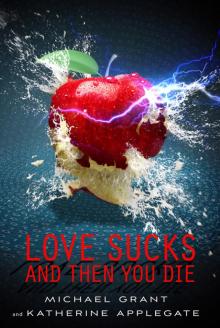 Love Sucks and Then You Die
Love Sucks and Then You Die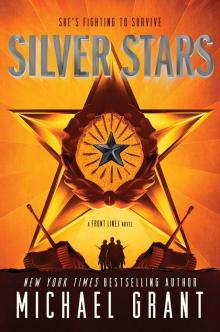 Silver Stars
Silver Stars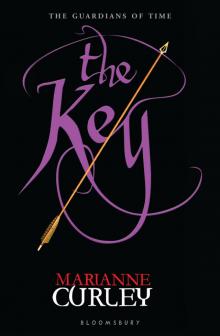 The Key
The Key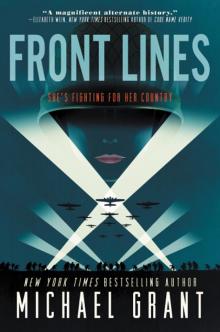 Front Lines
Front Lines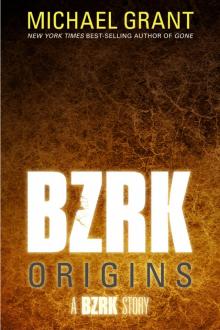 BZRK Origins
BZRK Origins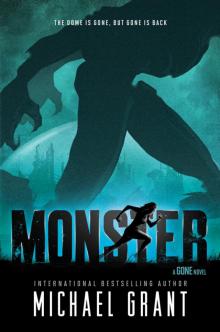 Monster
Monster Gone
Gone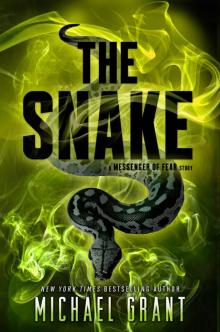 The Snake
The Snake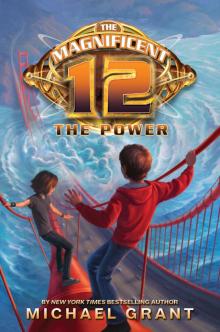 The Power
The Power Hunger
Hunger Lies
Lies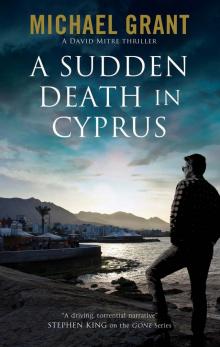 A Sudden Death in Cyprus
A Sudden Death in Cyprus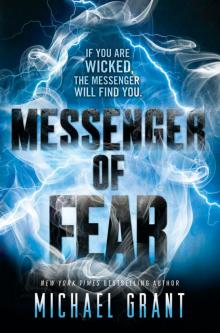 Messenger of Fear
Messenger of Fear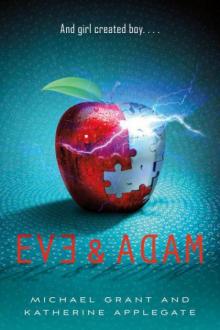 Eve & Adam
Eve & Adam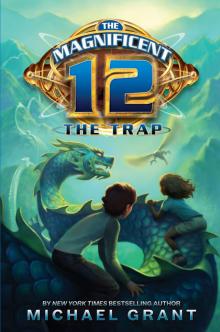 The Trap
The Trap Light
Light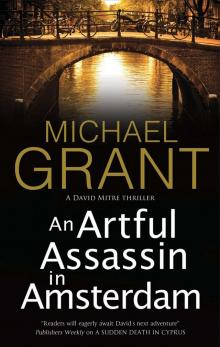 An Artful Assassin in Amsterdam
An Artful Assassin in Amsterdam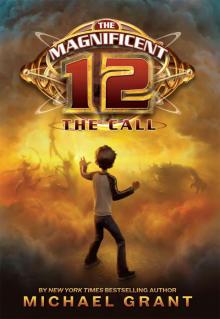 The Call
The Call Hero
Hero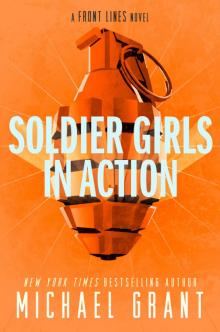 Soldier Girls in Action
Soldier Girls in Action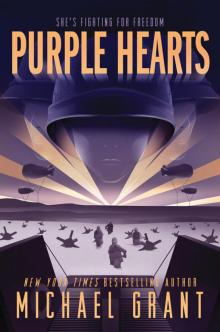 Purple Hearts
Purple Hearts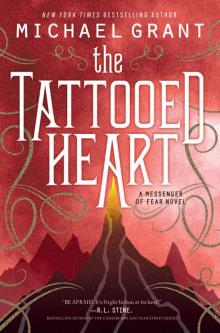 The Tattooed Heart
The Tattooed Heart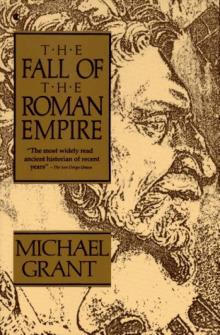 The Fall of the Roman Empire
The Fall of the Roman Empire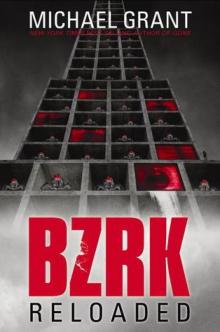 BZRK Reloaded
BZRK Reloaded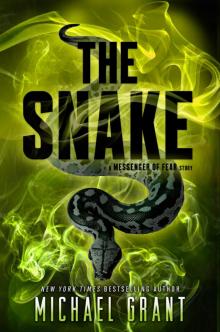 Messenger of Fear Novella #1
Messenger of Fear Novella #1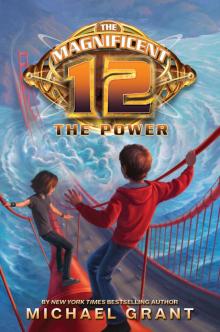 The Magnificent 12
The Magnificent 12 Fear: A Gone Novel
Fear: A Gone Novel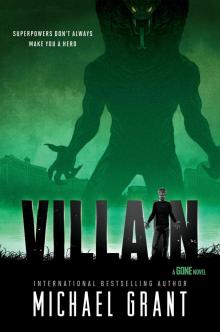 Villain
Villain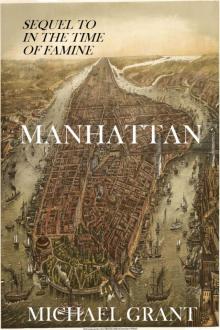 Manhattan
Manhattan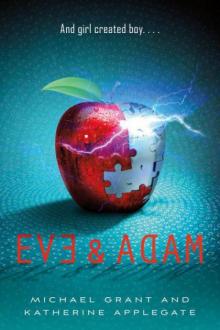 Eve and Adam
Eve and Adam Plague: A Gone Novel
Plague: A Gone Novel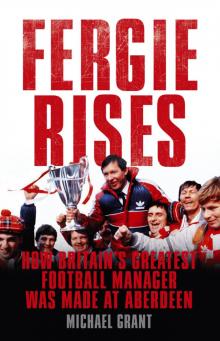 Fergie Rises
Fergie Rises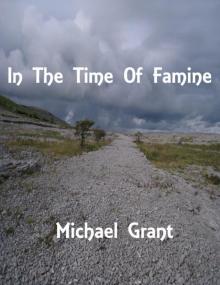 In the Time of Famine
In the Time of Famine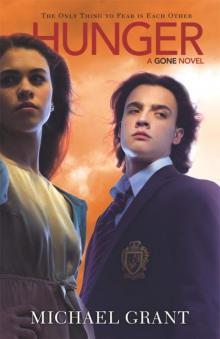 Hunger_A Gone Novel
Hunger_A Gone Novel Lies g-3
Lies g-3